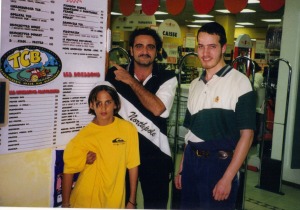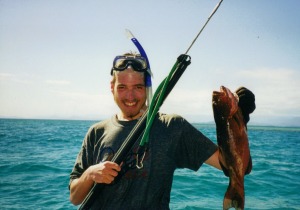
Traditional fishing boat at Ille Des Pins New Caledonia
This story is about my Rosh Hashanah and Yom Kippur experience in 1998 with the Jewish community in Numea, New Caledonia.
“A person’s earnings for the coming year are determined in the days between Rosh Hashana and Yom Kippur.” (Talmud, Beitza 16a)
The plane taxied slowly to the airport terminal and then came to a stop. I strapped on my backpack, picked up the Torah scroll, and headed to clear New Caledonian customs. As I had expected, a man met me at the exit gate. He was thrilled to see me with the Torah. “It has been so long,” the man said. “May I carry it?”
I handed him the Torah which he held reverently for a few seconds. Then his face lit up with the biggest smile. “We are so delighted you could come,” said the man. “We are maybe 150 Jewish people here, mostly from Algeria and Tunisia. It has been a long time since we have had a rabbi and a Torah.”
“I am not a rabbi,” I corrected him. “I am an 18-year-old studying in a Rabbinical seminary. Perhaps one day I will be a rabbi.”
“Yes, but you can read from the Torah. You know how to blow the shofar, lead the prayers, and put up some mezuzot. We here cannot do this very well. We are isolated on this island.”
The man’s name was Abraham. I knew this from having spoken to him on the phone. Other than knowing his name, I knew nothing about him, though I’d learn a lot as he welcomed me to stay in his home for the following weeks.
Abraham spoke with me in French. I understood most of what he was saying with my Montreal, Quebec French, though there were some differences. When we needed clarification we switched to broken Hebrew. Abraham had never been to Israel but his parents had taught him some Hebrew when he lived in Algeria.
The truth was that I had not wanted to come to New Caledonia for the High Holidays. I had just spent almost an entire year of intensive study in Australia and was scheduled to fly home to Montreal. I wanted to see my family and friends. There was also a synagogue in Montreal that had offered to pay me $800 to conduct services over the High holidays.

Placing a Mezuzah in New Caledonia
But two weeks before the end of the school term a call had come through. The Jewish community of New Caledonia wanted a rabbi for a few weeks. The senior yeshiva students laid a “guilt trip” on me. I was the only student in the yeshiva who could lead a service, blow shofar, and speak French. In addition, they knew that I had backpacked solo around Europe, so they thought I might just be crazy enough to go solo to this French Polynesian island.
After a large dose of hearing that I was the only one who could do the job, I agreed to go. I found someone who would lend me a small Torah scroll, provided I insure it. Also, as requested by the community, I purchased 10 mezzuot and 50 kippot on the agreement that they would pay me back for everything.
Though I wouldn’t earn the money I could have earned in Montreal, I imagined that I would at least have some fun exploring the island. But upon arriving in New Caledonia, I wasn’t so sure about that.
In the week preceding Rosh Hashana, I visited Jews in and around Numea. I affixed 10 mezuzot to door-posts, put tefillin on people, helped a boy find a yeshiva in Israel, and even had an interview with a local newspaper. I was kept busy teaching Torah and it seemed as if all 150 Jews wanted to meet and talk with me.
I was asked to sit through a number of community meetings and I gave my two cents when asked, and sometimes even when not. At one point they were discussing building plans for a new synagogue and mikva. One of the big donors did not want to give any money towards the construction of the mikva. “If you have money for just a synagogue or a mikva, Jewish law requires that you build a mikva,” I explained. It took a little more convincing, but in the end he agreed to contribute.
I finally did get a few days’ break in the days between Rosh Hashana and Yom Kippur. A wealthy community member rented for me a wave runner for a full day. I rode from one island to the next, stopping off to snorkel in the reefs teaming with magnificent coral and fish life. The next day he gave me a plane ticket to one of the smaller neighboring islands. I cycled around, exploring native villages where people lived in grass huts, caves filled with bats, and deserted white sandy beaches. I picked green coconuts to drink and found plenty opportunities to escape into my own tropical paradise.
When I got back Abraham set me up to go spear fishing with one of the local champions he knew well. Needless to say I didn’t spear anything but the fisherman gave me half his catch to take back for Abraham to cook for us. It was a delightful change from canned tuna.

Spear Fishing in New Caledonia for Rosh Hashanah food
The two and a half weeks flew by. As Abraham drove me to the airport, I sat in the car thinking; “Even if I did not make any money I accomplished a lot and had a great time. The money made in Montreal would have been nice, but I got to have an incredible experience.” In addition, I had flights to Montreal and would please G-d see my family in the next 24 hours.
“We are very thankful that you came and for all your help,” Abraham said, as he bid me good-bye. “We want to give you something as a token of our appreciation.” He handed me an envelope. In the envelope there were $1000 Australian Dollars, which equaled $800 Canadian based on the exchange rate at that time. I had just received the same amount of money that I would have earned had I forgone New Caledonia and gone home to Montreal.
At the young age of 18, my trip to New Caledonia had helped me realize that I could not make one penny more or less than what G-d had intended for me. I did the right thing by coming to help the New Caledonian community, I had an awesome experience, and I received the exact amount of money that was destined to be mine.
*The Talmud (Beitza 16a) states that the amount a person will earn for the year is determined in the days between Rosh Hashana and Yom Kippur, except for one’s expenditures in honor of Shabbat, Jewish holidays, and for the Torah education of one’s children.
Read More

















